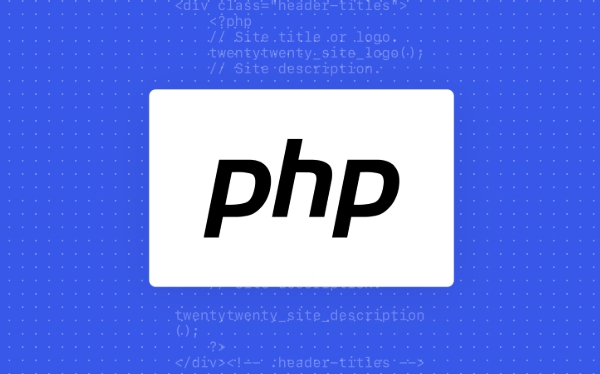what is undefined index in PHP
The reasons and ways to avoid the error "undefined index": 1. The reasons include accessing GET/POST parameters that have not been passed, array logic errors, variable index not set, etc.; 2. Solutions include using isset() to check whether the key exists, using array_key_exists() to judge, and using the empty merge operator to provide default values; 3. Development suggestions include unified parameter verification, enabling debugging prompts, viewing data structures, and using IDE inspection functions.

In PHP, "undefined index" is a common error message, meaning trying to access a key (index) that does not exist in an array. This error usually occurs when using $_GET , $_POST , $_SESSION , or other arrays, and is called directly without first determining whether a key exists.

Why is it reported "undefined index"?
This error usually occurs in the following situations:
- The data submitted by the form does not contain the fields you expect.
- A GET parameter is missing in the URL.
- The array assignment order or logic is incorrect, resulting in the key undefined in some cases.
- A variable is used as an array index, but the variable is empty or not set.
To give a simple example: If you write echo $_GET['username']; but do not pass ?username=xxx when accessing the page, an undefined index error will appear.

How to avoid "undefined index"?
To prevent this type of error, the key is to check before accessing the array elements . The following methods can be used:
-
Use
isset()to determine whether the key exists:
if (isset($_GET['username'])) { echo $_GET['username']; } else { echo 'Username not provided'; } Using
array_key_exists(), the difference between it andisset()is that it returns true even if the value isnull.Use the empty merge operator (PHP 7):
echo $_GET['username'] ?? 'Default';
These methods can effectively prevent the program from reporting errors because of accessing non-existent keys.
Some tips in actual development
- For form processing, it is best to perform parameter verification uniformly instead of taking the value directly.
- Turn on error prompts (such as
E_ALL) during the debug phase, which helps to discover potential undefined index problems. - If the data structure transmitted from the front end is quite complicated, it is recommended to use
var_dump()orprint_r()to see the structure before operating. - Use the IDE's automatic completion and syntax checking functions to sometimes have early warnings.
Basically that's it. Don’t panic when encountering undefined index. Most of the time, you just have a lack of judgment. Add isset() or use ?? to get it done.
The above is the detailed content of what is undefined index in PHP. For more information, please follow other related articles on the PHP Chinese website!

Hot AI Tools

Undress AI Tool
Undress images for free

Undresser.AI Undress
AI-powered app for creating realistic nude photos

AI Clothes Remover
Online AI tool for removing clothes from photos.

Clothoff.io
AI clothes remover

Video Face Swap
Swap faces in any video effortlessly with our completely free AI face swap tool!

Hot Article

Hot Tools

Notepad++7.3.1
Easy-to-use and free code editor

SublimeText3 Chinese version
Chinese version, very easy to use

Zend Studio 13.0.1
Powerful PHP integrated development environment

Dreamweaver CS6
Visual web development tools

SublimeText3 Mac version
God-level code editing software (SublimeText3)

Hot Topics
 1793
1793
 16
16
 1736
1736
 56
56
 1587
1587
 29
29
 267
267
 587
587
 Commenting Out Code in PHP
Jul 18, 2025 am 04:57 AM
Commenting Out Code in PHP
Jul 18, 2025 am 04:57 AM
There are three common methods for PHP comment code: 1. Use // or # to block one line of code, and it is recommended to use //; 2. Use /.../ to wrap code blocks with multiple lines, which cannot be nested but can be crossed; 3. Combination skills comments such as using /if(){}/ to control logic blocks, or to improve efficiency with editor shortcut keys, you should pay attention to closing symbols and avoid nesting when using them.
 Tips for Writing PHP Comments
Jul 18, 2025 am 04:51 AM
Tips for Writing PHP Comments
Jul 18, 2025 am 04:51 AM
The key to writing PHP comments is to clarify the purpose and specifications. Comments should explain "why" rather than "what was done", avoiding redundancy or too simplicity. 1. Use a unified format, such as docblock (/*/) for class and method descriptions to improve readability and tool compatibility; 2. Emphasize the reasons behind the logic, such as why JS jumps need to be output manually; 3. Add an overview description before complex code, describe the process in steps, and help understand the overall idea; 4. Use TODO and FIXME rationally to mark to-do items and problems to facilitate subsequent tracking and collaboration. Good annotations can reduce communication costs and improve code maintenance efficiency.
 Quick PHP Installation Tutorial
Jul 18, 2025 am 04:52 AM
Quick PHP Installation Tutorial
Jul 18, 2025 am 04:52 AM
ToinstallPHPquickly,useXAMPPonWindowsorHomebrewonmacOS.1.OnWindows,downloadandinstallXAMPP,selectcomponents,startApache,andplacefilesinhtdocs.2.Alternatively,manuallyinstallPHPfromphp.netandsetupaserverlikeApache.3.OnmacOS,installHomebrew,thenrun'bre
 Learning PHP: A Beginner's Guide
Jul 18, 2025 am 04:54 AM
Learning PHP: A Beginner's Guide
Jul 18, 2025 am 04:54 AM
TolearnPHPeffectively,startbysettingupalocalserverenvironmentusingtoolslikeXAMPPandacodeeditorlikeVSCode.1)InstallXAMPPforApache,MySQL,andPHP.2)Useacodeeditorforsyntaxsupport.3)TestyoursetupwithasimplePHPfile.Next,learnPHPbasicsincludingvariables,ech
 Improving Readability with Comments
Jul 18, 2025 am 04:46 AM
Improving Readability with Comments
Jul 18, 2025 am 04:46 AM
The key to writing good comments is to explain "why" rather than just "what was done" to improve the readability of the code. 1. Comments should explain logical reasons, such as considerations behind value selection or processing; 2. Use paragraph annotations for complex logic to summarize the overall idea of functions or algorithms; 3. Regularly maintain comments to ensure consistency with the code, avoid misleading, and delete outdated content if necessary; 4. Synchronously check comments when reviewing the code, and record public logic through documents to reduce the burden of code comments.
 Writing Effective PHP Comments
Jul 18, 2025 am 04:44 AM
Writing Effective PHP Comments
Jul 18, 2025 am 04:44 AM
Comments cannot be careless because they want to explain the reasons for the existence of the code rather than the functions, such as compatibility with old interfaces or third-party restrictions, otherwise people who read the code can only rely on guessing. The areas that must be commented include complex conditional judgments, special error handling logic, and temporary bypass restrictions. A more practical way to write comments is to select single-line comments or block comments based on the scene. Use document block comments to explain parameters and return values at the beginning of functions, classes, and files, and keep comments updated. For complex logic, you can add a line to the previous one to summarize the overall intention. At the same time, do not use comments to seal code, but use version control tools.
 Mastering PHP Block Comments
Jul 18, 2025 am 04:35 AM
Mastering PHP Block Comments
Jul 18, 2025 am 04:35 AM
PHPblockcommentsareusefulforwritingmulti-lineexplanations,temporarilydisablingcode,andgeneratingdocumentation.Theyshouldnotbenestedorleftunclosed.BlockcommentshelpindocumentingfunctionswithPHPDoc,whichtoolslikePhpStormuseforauto-completionanderrorche
 PHP Development Environment Setup
Jul 18, 2025 am 04:55 AM
PHP Development Environment Setup
Jul 18, 2025 am 04:55 AM
The first step is to select the integrated environment package XAMPP or MAMP to build a local server; the second step is to select the appropriate PHP version according to the project needs and configure multiple version switching; the third step is to select VSCode or PhpStorm as the editor and debug with Xdebug; in addition, you need to install Composer, PHP_CodeSniffer, PHPUnit and other tools to assist in development.






